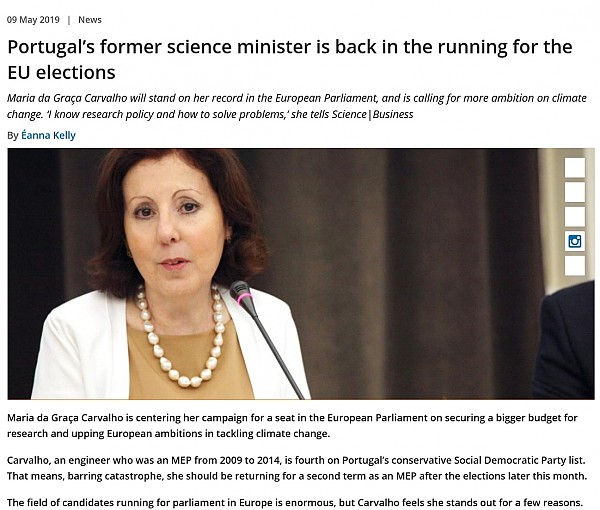Press Portugal’s former science minister is back in the running for the EU elections
Maria da Graça Carvalho will stand on her record in the European Parliament, and is calling for more ambition on climate change. ‘I know research policy and how to solve problems,’ she tells Science|Business.
By Éanna Kelly
Maria da Graça Carvalho is centering her campaign for a seat in the European Parliament on securing a bigger budget for research and upping European ambitions in tackling climate change.
Carvalho, an engineer who was an MEP from 2009 to 2014, is fourth on Portugal’s conservative Social Democratic Party list. That means, barring catastrophe, she should be returning for a second term as an MEP after the elections later this month.
The field of candidates running for parliament in Europe is enormous, but Carvalho feels she stands out for a few reasons.
“I have the different components. It makes a difference to have an MEP in parliament who understands research programmes,” she told Science|Business.
As one of the lead drafters for Horizon 2020, the current research programme, Carvalho claims to have corrected many of the niggling problems researchers were having with the administration of European research.
“I knew all the problems of the previous programme, FP7. I managed to fix these problems,” she said, pointing to some extremely practical changes. “There was a problem with the VAT, which left a hole in many researchers’ accounting systems. I managed to solve this. I was able to simplify the programme for small and medium-sized entities, and made researchers in Portugal more aware of the programme and willing to participate,” she said.
Carvalho is an establishment figure in Brussels, having acted as adviser to former European Commission president José Manuel Barroso (also from Portugal) from 2006 to 2009. For the last five years she has served as an adviser to EU research commissioner Carlos Moedas, and more recently as a staff member in both the Commission’s Scientific Advice Mechanism and in the research directorate’s clean air unit.
In Portugal, Carvalho twice served as science minister.
Get real on climate
As she contemplates returning to the European Parliament, Carvalho says her top issues will be more research spending and climate change. Her aim is to get a seat on both parliament’s research committee (ITRE) and the environment committee (ENVI).
The commission is proposing €94.1 billion for its 2021-2027 R&D programme, Horizon Europe, but the parliament wants to ramp this up to €120 billion. It’s a tall order, with research already in line for more money in the commission’s next long-term budget, at the expense of other big spending commitments in agriculture and regional investment.
Within Horizon Europe, Carvalho is calling for billions to be invested in research and development to lower the cost of solar power and develop other renewable energy technologies.
“We have to adapt to climate change, but our first priority is to find ways to decrease emissions,” she said.
Reflecting on climate change, Carvalho remembers the deadly wildfires that ravaged Portugal over the past few summers. Not only is much of Europe hotter than normal, but the weather is also more erratic, she says.
Taxing the tech giants
Carvalho also has her sights on other issues including cancer treatment and retraining workers who lose their jobs to automation.
Her party belong to parliament’s centre-right European Peoples’ Party family, which is fielding Manfred Weber for the post of Commission president. Weber, who is the favourite to succeed current president Jean-Claude Juncker, has proposed a new fund financed by a tax on big tech companies, to help workers affected by the onward march of technology.
“We cannot just talk about disruptive innovation. We also need to make sure people are not left behind,” Carvalho said.
Taxing US technology companies is a popular refrain in this election. However, in reality, Brussels will struggle to do this, since the main tax-raising powers reside with member states.
Weber is also calling for a doubling of EU investment in cancer research and treatment. “It’s a flagship project that translates the kindness he has,” said Carvalho. “We have to make it a chronic disease rather than a fatal disease.”
A changed place
Carvalho could be returning to a very different parliament. Far-right populist and nationalist parties that in the main are eurosceptic and hostile towards Brussels, are projected to do very well in the elections. Some polls suggest they could control up to a third of all seats.
“Populists are a worry, even if they’re not a phenomenon we have in Portugal. But overall, I remain optimistic. We should continue to tell people what we can do here, and show them the benefits of our work,” she said.
Everyone should be made aware that countries are “completely different before and after they join the EU.” Membership brings prosperity “not previously seen”, Carvalho said.
In Portugal, some question the value of paying into the EU’s research pot, she says. “There are people who would say Portugal is paying to benefit the rich countries; however, now, we are receiving more through the programme than ever before. It’s important to say out loud that we are benefiting a lot,” she said.
However, Carvalho is concerned that bickering over the formation of the next commission and continuing uncertainty on Brexit, could delay the start of Horizon Europe.
She vows to push back against protectionist ideas, such as the concerns some MEPs have expressed about opening up Horizon Europe to third countries. Some suggest that China, as an emerging science superpower, should not be granted access to the programme.
Carvalho says she understands the roots of this ‘Europe First’ approach. In the poorer EU countries, there can be unease about additional competition for funding, she says. “Everyone brings their own history to Brussels. But it’s not the right course for us. We have to be very open to the world.”
